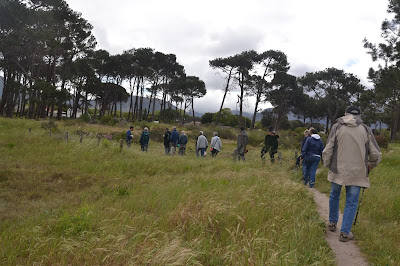"The United Nations have declared
Cape Town as the most biodiverse city in the world. Normally this is described
in terms of the amazing flora in our region, but it is also diverse in other
creatures including, mammals and insects. The Western Cape has the highest
diversity of monkey beetles in the world and many of our most prized flower
species (in particular the Iridaceae) have co-evolved alongside the rich monkey
beetle diversity and rely on them for seed production. This project seeks to
understand to what extent private gardens are providing habitat and foraging
ground for monkey beetles – particularly those gardens around fragments of
natural vegetation as can be found on Meadowridge Common. The beetles are in the
adult stage of their lifecycle in spring and climb into flowers to find and
compete for a mate. The project will conduct observations over two spring
seasons in 2018 and 2019, with the pilot starting in October 2018. I am calling
for volunteers in Meadowridge to participate in making weekly observations of
the flowers in their gardens over a period of 6-8 weeks during spring. Each
observation should take about 15 min and will include documenting the beetles in
flowers in a 16 m2 area in the garden along with variables such as
the weather conditions of the day and garden orientation. This study is the
first truly urban study of monkey beetle populations to be conducted anywhere in
the world."
To sign up, or just to find out
more, please write to Peta Brom at brompeta@gmail.com. Peta Blom, B. Phil (Sustainable Development Planning and Management), (Stel) cum laude; M.Phil EGS (UCT), PhD Candidate (UCT)

























